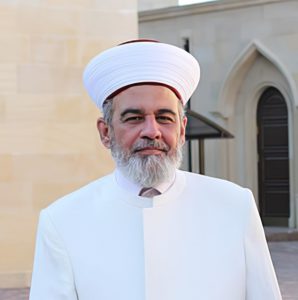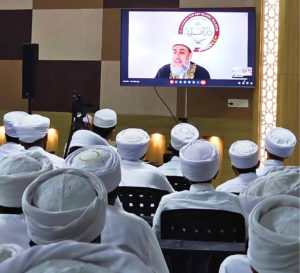Praise be to Allah the Lord of the worlds. We ask Allah to raise the rank of our dear and beloved prophet Muhammad, his Al, chaste companions, pure wives-the mothers of the believers, and all who truly follow him till the day of judgement. We ask Allah to protect his nation from what he fears for them. We ask Allah to guide us to what is acceptable and rewardable.
Abu Thar Al-Ghifariy, the companion of the Prophet ﷺ said: “My confidant entrusted me with habits of goodness. He entrusted that I love the needy (masaqin) and be close to them”.
It was the habit of the prophet ﷺ that, if he had not seen a companion for some time, he would ask about him with concern. This was so, to the extent that when he asked about a poor man who was a foreigner but a believer, and they said he had died, he asked for the whereabouts of his grave and went there and prayed for him. To this extent, he ﷺ was concerned about the masaqin and genuinely cared for them.
He [Aba Thar] said: “…he entrusted me to admire those who have less worldly matters than I do and to not admire those who have more worldly matters than I do”.
This means he was cautioned to not take interest in the matters of the wealthy people, but to take interest in the matters of the poor. For, if one were to take interest in the matters of the wealthy, one would disregard the virtues that Allah has given one and would become greedy and not praise Allah for the goodness granted by Allah. This will become his state of mind because he will be preoccupied with becoming like those wealthy people. One will then become consumed with the material life, to an extent that one will carelessly start to increase his wealth in sinful ways. His main concern will be to become rich.
However, if one considers the situation of the poor people, one will become more thankful to Allah and one will be more inclined to do good deeds and provide for those who are less fortunate than he is.
Aba Thar said: “…and he entrusted me to keep ties with kin (Ar-Rahim) even if they neglect one”.
This means, the prophet advised for one to keep ties with one’s kin even if the kin have broken their ties with one. Ar-Rahm-kin, refers to all the blood relatives. One must keep ties with them even if they do not appreciate his good approach. So much so that, one must be good to his kin even if they approach him with harm and one should not cease being kind to them no matter how hurtful they become. By this practice one will gain a great reward from Allah. This is so, because Allah loves for the believer to extent goodness to those who show appreciation and those who do not respond with goodness. Hence, the one who extends goodness to his kin who is mutually good to him, earns a reward lesser than the reward of the one who extends goodness to the kin who does not relay goodness in return. This is so because being good to the kin who is not mutual requires more effort and a humbling of the self, and Allah loves those who do-good. Hence, the one who extends goodness to the kin who does not extend goodness mutually, will earn a greater reward.
Also Aba Thar said: “…and he entrusted me to say the truth, even if it is bitter”.
It means, the Muslim is accountable to always speak the truth whether it be to people who like to hear it or to those who do not like to hear the truth.
Also Aba Thar said: “and to persistently say the phrase, ‘no one can evade sinning without the protection of Allah and no-one has the power to obey except with His aid’”
It has been narrated from the Prophet ﷺ that this phrase carries great rewards and benefits. Regarding its reward – it was mentioned in a sahih hadith that it is a treasure chest under the grand throne. That is, it is a treasure trove of rewards Thawab which Allah will grant to the believer who recites this honourable phrase repeatedly. The believer will receive these treasures in reward in the hereafter.
Regarding its benefits – it is known to vanish the worries. If one is consumed by worries, the best deed for one to do is to say this phrase repeatedly. This phrase also helps the one who is delusional or inflicted with a type of neurotic fear and feels isolated and deserted to the extent of insanity. This phrase helps relieve the one inflicted with such calamities if one says this phrase persistently and repeatedly. Consequently, the hardship will inevitably turn to ease, by the will of Allah. Allah the Exalted made this phrase virtuous and with great merits; dispersing one’s worries is the least of the tens of virtues that it encompasses.
As for what it holds in meaning, it refers to Tawhid (asserting the Oneness of Allah). It asserts that no one has the power to obey or do good deeds without the help of Allah and no one has the will to avoid evil if Allah does not protect one from it by His will.
Hence, no matter how much effort one puts forward in obedience, it is all by the will and aid of Allah. Thus, one must praise Allah. Let the one whom Allah enabled to do good, praise Allah for that ability and not be affected by vanity. Instead, let one remember that Allah is the One who enabled one to do these good deeds of obedience and without the will of Allah one would not have been able to do the good deeds. Moreover, if one always remembers the fact that Allah is the One who enabled one to do the good deeds, one will become distant from riya’ insincerity and his rank will be close to the ranks of the noble. The one who does a good deed in sincerity to Allah and clear from riya’ i.e. seeking the praise of people is rewarded – to Allah, a tiny deed done with sincerity is rewarded greatly.





